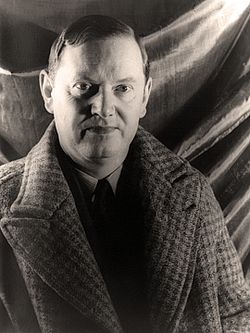Evelyn Waugh Quote
I knew it all, the whole drab compass of marital disillusion; we had been through it together, the Army and I, from the first importunate courtship until now, when nothing remained to us except the chill bonds of law and duty and custom. I had played every scene in the domestic tragedy, had found the early tiffs become more frequent, the tears less affecting, the reconciliations less sweet, till they engendered a mood of aloofness and cool criticism, and the growing conviction that it was not myself but the loved one who was at fault. I caught the false notes in her voice and learned to listen for them apprehensively; I recognized the blank, resentful stare of incomprehension in her eyes, and the selfish, hard set of the corners of her mouth. I learned her, as one must learn a woman one has kept house with, day in, day out, for three and a half years; I learned her slatternly ways, the routine and mechanism of her charm, her jealousy and self-seeking, and her nervous trick with the fingers when she was lying. She was stripped of all enchantment now and I knew her for an uncongenial stranger to whom I had bound myself indissolubly in a moment of folly.
I knew it all, the whole drab compass of marital disillusion; we had been through it together, the Army and I, from the first importunate courtship until now, when nothing remained to us except the chill bonds of law and duty and custom. I had played every scene in the domestic tragedy, had found the early tiffs become more frequent, the tears less affecting, the reconciliations less sweet, till they engendered a mood of aloofness and cool criticism, and the growing conviction that it was not myself but the loved one who was at fault. I caught the false notes in her voice and learned to listen for them apprehensively; I recognized the blank, resentful stare of incomprehension in her eyes, and the selfish, hard set of the corners of her mouth. I learned her, as one must learn a woman one has kept house with, day in, day out, for three and a half years; I learned her slatternly ways, the routine and mechanism of her charm, her jealousy and self-seeking, and her nervous trick with the fingers when she was lying. She was stripped of all enchantment now and I knew her for an uncongenial stranger to whom I had bound myself indissolubly in a moment of folly.
Related Quotes
Mark, trying his best to distance himself from the cruel and pathetic 21st century, hadn’t listened to the news reports, not even when the dark green jeeps and helicopters showed up in town, men dress...
About Evelyn Waugh
Waugh, the son of a publisher, was educated at Lancing College and then at Hertford College, Oxford. He worked briefly as a schoolmaster before he became a full-time writer. As a young man, he acquired many fashionable and aristocratic friends and developed a taste for country house society.
He travelled extensively in the 1930s, often as a special newspaper correspondent; he reported from Abyssinia at the time of the 1935 Italian invasion. Waugh served in the British armed forces throughout the Second World War, first in the Royal Marines and then in the Royal Horse Guards. He was a perceptive writer who used the experiences and the wide range of people whom he encountered in his works of fiction, generally to humorous effect. Waugh's detachment was such that he fictionalised his own mental breakdown which occurred in the early 1950s.
Waugh converted to Catholicism in 1930 after his first marriage failed. His traditionalist stance led him to strongly oppose all attempts to reform the Church, and the changes by the Second Vatican Council (1962–65) greatly disturbed his sensibilities, especially the introduction of the vernacular Mass. That blow to his religious traditionalism, his dislike for the welfare state culture of the postwar world, and the decline of his health all darkened his final years, but he continued to write. He displayed to the world a mask of indifference, but he was capable of great kindness to those whom he considered his friends. After his death in 1966, he acquired a following of new readers through the film and television versions of his works, such as the television serial Brideshead Revisited (1981).
